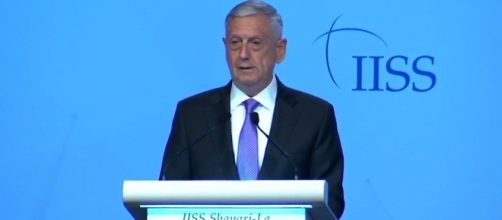In the mid of mounting threats to security, the United States defense secretary Jim Mattis has reaffirmed America’s commitment to the Asia-Pacific region to anxious allies.
He rephrased a comment of former British Prime Minister Winston Churchill when an attendant at a roundtable dialogue asked whether or not the world was experiencing the destruction of a rule-based disposition initiated by the U.S. during World War Ii.
Options on North Korea
Mattis said “bear with us,” to ministers of defense and military officials from more than 22 countries in a ballroom.
“Once we’ve completely use up all available options, the Americans will do the needful. We are there and will continue to be there,” he said.
The planners of the yearly Shangri-La Dialogue Asian Security Summit noted three possible flashpoints posing threat to security and stability in the region: North Korea’s missile and nuclear weapons program, China’s military activities in the South China Sea and Islamist extremism.
However, President Trump’s pursuit of his “America First” policy has created doubt over the United States future role in Asia. The United States has shown the strongest military influence in the Asia-Pacific region since the end of World War II.
US allies concern
Australian Prime Minister Malcolm Turnbull demonstrated his disappointment over the U.S.
recent exit from the Paris Climate pact and the Trans-Pacific Partnership – a multilateral trade agreement that was meant to join the U.S. economically, with allies from 12 Asian nations. However, The Australian PM urged fellow allies to exercise patience with the new U.S. government.
“We should be mindful not to hastily interpret an aim to engage on different terms as one to engage at all,” Turnbull said on Friday night.
On his part Mattis vowed on Saturday the United States would remain engaged on North Korea, describing the regime of Kim Jong Un’s missile and nuclear weapons program “a clear and present danger.”
US commitment to its allies
He further reiterated the U.S. longstanding commitment to defend South Korea and Japan from any aggressive North Korean military and nuclear threat, but he maintained that Beijing must continue on with its pledges to denuclearize the Korean Peninsula by mounting pressure on Pyongyang.
The US government has pledged to engage China on North Korea, but President Trump has repeatedly sounded U.S. resolve to act unilaterally if China fails to act.


